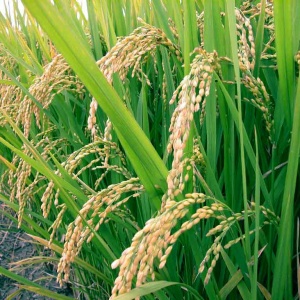
600 million people could be affected as climate change decreases the levels of several nutrients in rice, according to a new paper. The paper estimated changes in rice nutrient content using experiments where rice (of several different cultivars) was grown under conditions of enriched CO2. At the higher CO2 levels, the following average decreases in nutrient levels were found compared to rice grown under ambient CO2: 10% for protein; 8% for iron; 5% for zinc; 17% for vitamin B1; 17% for vitamin B2; 13% for vitamin B5; 30% for vitamin B9. In contrast, vitamin E levels were 14% higher under elevated CO2 levels.
In the rice-growing experiments, the enriched CO2 concentrations ranged from 568 to 590 μmol mol−1, while the ambient CO2 levels varied from 374 to 386 μmol mol−1. The unit μmol mol−1 is equivalent to ppm. Current (June 2018) atmospheric CO2 levels are around 410 ppm, compared to roughly 280 ppm in the pre-industrial era (reference here). The paper says it is very likely that atmospheric CO2 will exceed 570 ppm by the end of the century.
The paper points out that 600 million people currently obtain half or more of their energy and/or protein from rice and could therefore be put at risk by future climate-induced decreases in nutrient levels. However, it says that economic development might moderate these nutritional impacts, because people tend to choose more diverse diets as their income increases.
The paper points to some strategies for mitigating the impact of the study’s findings, including development of rice cultivars that have higher nutrient levels at higher CO2 concentrations, use of mineral fertilisers, post-harvest fortification, education of consumers on the impact of CO2 levels on nutrition and further research into the human health effects of changed nutrient levels in crops.
Abstract
Declines of protein and minerals essential for humans, including iron and zinc, have been reported for crops in response to rising atmospheric carbon dioxide concentration, [CO2]. For the current century, estimates of the potential human health impact of these declines range from 138 million to 1.4 billion, depending on the nutrient. However, changes in plant-based vitamin content in response to [CO2] have not been elucidated. Inclusion of vitamin information would substantially improve estimates of health risks. Among crop species, rice is the primary food source for more than 2 billion people. We used multiyear, multilocation in situ FACE (free-air CO2 enrichment) experiments for 18 genetically diverse rice lines, including Japonica, Indica, and hybrids currently grown throughout Asia. We report for the first time the integrated nutritional impact of those changes (protein, micronutrients, and vitamins) for the 10 countries that consume the most rice as part of their daily caloric supply. Whereas our results confirm the declines in protein, iron, and zinc, we also find consistent declines in vitamins B1, B2, B5, and B9 and, conversely, an increase in vitamin E. A strong correlation between the impacts of elevated [CO2] on vitamin content based on the molecular fraction of nitrogen within the vitamin was observed. Finally, potential health risks associated with anticipated CO2-induced deficits of protein, minerals, and vitamins in rice were correlated to the lowest overall gross domestic product per capita for the highest rice-consuming countries, suggesting potential consequences for a global population of approximately 600 million.
Reference
Zhu, C., Kobayashi, K., Loladze, I., Zhu, J., Jiang, Q., Xu, X., Liu, G., Seneweera, S., Ebi, K.L., Drewnowski, A. and Fukagawa, N.K., 2018. Carbon dioxide (CO2) levels this century will alter the protein, micronutrients, and vitamin content of rice grains with potential health consequences for the poorest rice-dependent countries. Science advances, 4(5), p.eaaq1012.
Find the full paper here. See also the Foodsource resource What is the likely human impact?, which discusses the impacts of climate change on human health.







Post a new comment »